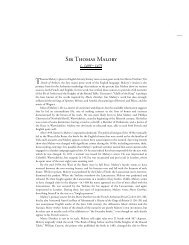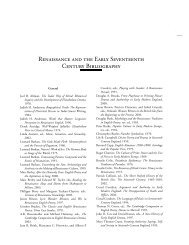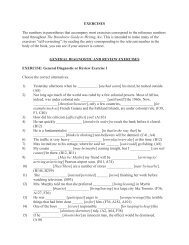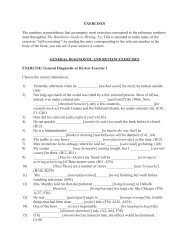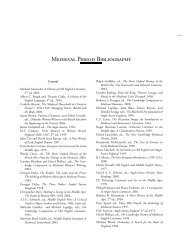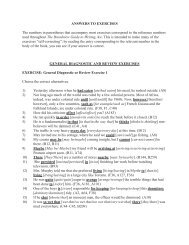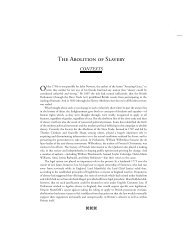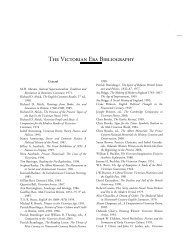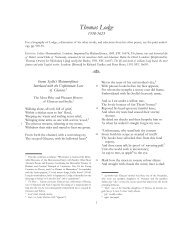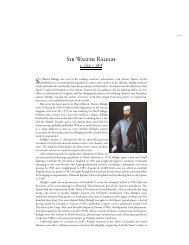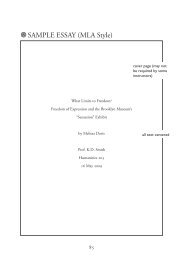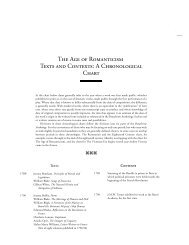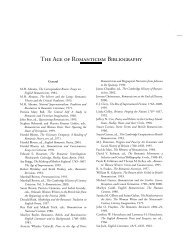A Chronological Chart - Broadview Press Publisher's Blog
A Chronological Chart - Broadview Press Publisher's Blog
A Chronological Chart - Broadview Press Publisher's Blog
Create successful ePaper yourself
Turn your PDF publications into a flip-book with our unique Google optimized e-Paper software.
The Twentieth Century and Beyond<br />
Texts and Contexts: A <strong>Chronological</strong><br />
<strong>Chart</strong><br />
In the chart below, dates generally refer to the year when a work was first made public, whether<br />
published in print or, in the case of dramatic works, made public through the first performance of a<br />
play. Where that date is known to differ substantially from the date of composition, the difference<br />
is generally noted. With medieval works, where there is no equivalent to the “publication” of later<br />
eras, where texts often vary greatly from one manuscript copy to another, and where knowledge of<br />
date of original composition is usually imprecise, the date that appears is an estimate of the date of<br />
the work’s origin in the written form included or referenced in the <strong>Broadview</strong> Anthology. Earlier oral<br />
or written versions are of course in some cases real possibilities.<br />
Divisions in these chronological charts follow the divisions into six parts of the <strong>Broadview</strong><br />
Anthology. For the convenience of those who may be focusing on only one period, but who may wish<br />
to look slightly beyond its boundaries as they are generally defined, there is in some cases an overlap<br />
between periods in these chronologies. The Restoration and the Eighteenth Century chart, for<br />
example, carries through to the end of the eighteenth century (thereby overlapping with the chart for<br />
The Age of Romanticism), and the chart for The Victorian Era begins several years before Victoria<br />
came to the throne.<br />
Texts<br />
1899 Helen Bannerman, The Story of Little Black Sambo<br />
Joseph Conrad, Heart of Darkness<br />
Arthur Symons, The Symbolist Movement in<br />
Literature<br />
Oscar Wilde, The Importance of Being Earnest: A<br />
Trivial Comedy for Serious People<br />
Oscar Wilde, An Ideal Husband<br />
William Butler Yeats, The Wind Among the Reeds<br />
<br />
Contexts<br />
1899 Irish Literary Theatre founded<br />
Sigmund Freud publishes Die Traumdeutung<br />
(The Interpretation of Dreams)<br />
1899-1902 South African War (also known as the Anglo-<br />
Boer War): an influx of British settlers to the<br />
Transvaal following the discovery of gold in<br />
1885 had put pressure on relations between<br />
Britain and the independent republics of the<br />
Orange Free State and the Transvaal (South<br />
African Republic), both controlled by Dutchdescended<br />
Afrikaners. Tensions were<br />
exacerbated by the abortive 1896 Jameson raid<br />
(led by Starr Jameson of the Rhodesian police<br />
force), which was an attempt by the British to
2 The Twentieth Century and Beyond<br />
1900 Winston Churchill, London to Ladysmith via<br />
Pretoria<br />
Joseph Conrad, Lord Jim<br />
H.G. Wells, Love and Mr. Lewisham<br />
1901 Miles Franklin, My Brilliant Career<br />
Rudyard Kipling, Kim<br />
H.G. Wells, The First Men in the Moon<br />
1902 Joseph Conrad, Youth<br />
Arthur Conan Doyle, The Hound of the Baskervilles<br />
Rudyard Kipling, Just So Stories for Little Children<br />
Alice Meynell, Later Poems<br />
E(dith) Nesbit, Five Children and It<br />
Beatrix Potter, The Tales of Peter Rabbit<br />
Bernard Shaw, Mrs. Warren’s Profession (first<br />
private performance, Stage Society. Shaw<br />
completed the original version of the play in<br />
1892; it was first published [in Plays Pleasant<br />
and Unpleasant] in 1898, and first<br />
performed publicly [and subsequently<br />
banned] in New York, 1905. The Lord<br />
Chamberlain’s ban on its public<br />
performance in Britain was removed in<br />
1924)<br />
incite expatriate British workers in the Transvaal<br />
to rebel against the local government. In the war<br />
itself, the British suffered several embarrassing<br />
defeats (leading many in Britain to question the<br />
government’s colonial strategy) before finally<br />
overcoming the Afrikaner forces. The two<br />
republics were incorporated into the British<br />
Empire at war’s end, but in 1912 South Africa<br />
was granted largely autonomous status as a<br />
dominion<br />
1900 Boxer Rebellion: this uprising in northern China<br />
was led by the Righteous Harmony Society<br />
(nicknamed the Boxers by Westerners), who<br />
were protesting the degree to which citizens and<br />
companies from Britain and other Western<br />
countries were given favorable treatment by the<br />
Qing dynasty. For some months the foreign<br />
compound in Beijing was under siege, but by<br />
year’s end the rebellion had been suppressed<br />
(and numerous reprisals carried out)<br />
1901 Queen Victoria dies; Edward VII succeeds to<br />
the throne<br />
First wireless communication across the Atlantic<br />
Factory Act forbids the employment in factories<br />
or workshops of children under the age of 12<br />
Commonwealth of Australia formed
1903 Samuel Butler, The Way of All Flesh<br />
Joseph Conrad, Typhoon and Other Stories<br />
1904 J.M. Barrie, Peter Pan: The Boy Who Would Not<br />
Grow Up<br />
Aubrey Beardsley, Under the Hill (unexpurgated<br />
version published as The Story of Venus and<br />
Tannhauser in 1907)<br />
A.C. Bradley, Shakespearean Tragedy<br />
G.K. Chesterton, The Napoleon of Notting Hill<br />
Joseph Conrad, Nostromo: A Tale of the Seaboard<br />
Sara Jeannette Duncan, The Imperialist<br />
Thomas Hardy, The Dynasts: A Drama of the<br />
Napoleonic Wars (first part; third and final<br />
part published in 1908)<br />
W.H. Hudson, Green Mansions<br />
“Saki” (Hector Hugh Munro), Reginald<br />
1905 Ernest Dowson, The Poems of Ernest Dowson<br />
Arthur Conan Doyle, The Return of Sherlock<br />
Holmes<br />
Bernard Shaw, Major Barbara<br />
H.G. Wells, Kipps: The Story of a Simple Soul<br />
1906 H.W. Fowler and F.G. Fowler, The King’s<br />
English<br />
John Galsworthy, The Man of Property<br />
E(dith) Nesbit, The Railway Children<br />
1907 Joseph Conrad, The Secret Agent<br />
J.M. Synge, The Aran Islands<br />
J.M. Synge, The Playboy of the Western World<br />
Texts and Contexts 3<br />
1903 Women’s Social and Political Union (known as<br />
the “suffragettes”) formed as a more militant<br />
breakaway group from the National Union of<br />
Women’s Suffrage Societies<br />
Orville and Wilbur Wright achieve a sustained<br />
flight in a power-driven airplane<br />
1905 The Imperial Guard of Russia attacks a peaceful<br />
crowd of strikers and other demonstrators on<br />
“Bloody Sunday,” killing approximately 1,000,<br />
injuring thousands more, and sparking an<br />
attempted revolution throughout the Russian<br />
Empire against the rule of Czar Nicholas II<br />
Aliens Act of 1905 implements measures<br />
designed to deter Jewish immigration<br />
Albert Einstein formulates his Theory of Special<br />
Relativity<br />
1907 Rudyard Kipling becomes the first British<br />
winner of the Nobel Prize for Literature<br />
Robert Baden-Powell founds the Boy Scouts;<br />
the Girl Guides are founded two years later
4 The Twentieth Century and Beyond<br />
1908 Arnold Bennett, The Old Wives’ Tale<br />
E.M. Forster, A Room with a View<br />
Kenneth Grahame, The Wind in the Willows<br />
Lucy Maud Montgomery, Anne of Green Gables<br />
1910 E.M. Forster, Howards End<br />
Bertrand Russell and A.N. Whitehead, Principia<br />
Mathematica<br />
H.G. Wells, The History of Mr. Polly<br />
1911 G.K. Chesterton, The Innocence of Father Brown<br />
Katherine Mansfield, In a German Pension<br />
Mary Ward, The Case of Richard Meynell<br />
1912 William Archer, Play-Making<br />
Stephen Leacock, Sunshine Sketches of a Little<br />
Town<br />
Isaac Rosenberg, Night and Day<br />
Saki, The Unbearable Bassington<br />
May Sinclair, Feminism<br />
1908 Olympic Games in London<br />
1909 People’s budget introduced by the Liberal<br />
government of Prime Minister Herbert Asquith<br />
and Chancellor of the Exchequer David Lloyd<br />
George. This budget was revolutionary in its<br />
measures to redistribute wealth more equitably<br />
in British society; its provisions included a<br />
graduated income tax—a measure that was<br />
rejected by the House of Lords<br />
Hunger strike by imprisoned suffrage activists<br />
Ford Motor Company begins production of the<br />
Model T<br />
1910 Landmark exhibition of post-impressionist art in<br />
London, organized by Roger Fry<br />
Union of South Africa granted dominion status<br />
Edward VII dies; George V comes to the throne<br />
1911 Health and unemployment insurance<br />
introduced through the National Insurance Act<br />
Constitutional crisis over the power of the<br />
House of Lords results in the Parliament Act,<br />
restricting the Lords’ power to veto House of<br />
Commons legislation<br />
Q’ing dynasty (the last monarchy in China)<br />
overthrown in a revolution led by Sun Yat-sen; a<br />
new republic is established<br />
1912 Major suffragette demonstrations in London<br />
Extension of copyright restrictions in Britain to<br />
fifty years after the death of the author<br />
Norwegian expedition led by Roald Amundsen<br />
reaches the South Pole and returns safely; rival<br />
expedition led by Robert Scott of Britain reaches<br />
the Pole a month later, and all members of the
1913 J.M. Barrie, Quality Street<br />
D.H. Lawrence, Love Poems and Others<br />
D.H. Lawrence, Sons and Lovers<br />
Leonard Woolf, The Village in the Jungle<br />
1914 J.M. Barrie, The Admirable Crichton<br />
Joseph Conrad, Chance<br />
James Joyce, Dubliners<br />
first issue of Blast: Review of the Great English<br />
Vortex (edited by Wyndham Lewis)<br />
Bernard Shaw, Common Sense About the War<br />
Bernard Shaw, Pygmalion (first performed in<br />
English; performed in German in Vienna<br />
the previous year)<br />
H.G. Wells, The War That Will End War<br />
1915 John Buchan, The Thirty-Nine Steps<br />
Joseph Conrad, Victory<br />
Ford Madox Ford, The Good Soldier<br />
D.H. Lawrence, The Rainbow<br />
Somerset Maugham, Of Human Bondage<br />
Alice Meynell, Poems on the War<br />
Dorothy Richardson, Pointed Roofs (first<br />
volume of the Pilgrimage series)<br />
Virginia Woolf, The Voyage Out<br />
1916 John Buchan, Greenmantle<br />
Thomas Hardy, Selected Poems<br />
James Joyce, Portrait of the Artist as a Young<br />
Man<br />
Ada Leverson, Love at Second Sight<br />
H.G. Wells, Mr. Britling Sees It Through<br />
H.G. Wells, Easter<br />
Texts and Contexts 5<br />
expedition succumb to sickness and starvation as<br />
they attempt to return<br />
1913 Bill providing for Irish Home Rule is passed<br />
twice by the House of Commons and both<br />
times defeated in the House of Lords<br />
First performance of Igor Stravinsky’s<br />
revolutionary ballet, The Rite of Spring<br />
Suffragette Emily Davidson throws herself in<br />
front of a horse ridden by King George V during<br />
the Epsom Derby and is killed<br />
1914 Archduke Franz Ferdinand assassinated,<br />
sparking the outbreak of World War I<br />
First battle of Ypres<br />
1915 Coalition government formed in Britain<br />
Second battle of Ypres<br />
1916 Easter rising in Dublin<br />
Battles of Verduyn and the Somme<br />
Evacuation of Australian and British forces from<br />
Gallipoli in Turkey after a disastrous expedition<br />
First use of tanks in warfare<br />
Establishment in India of Home Rule Leagues,<br />
pressing for independence from British Colonial<br />
Rule<br />
Carl Jung, Psychology of the Unconscious
6 The Twentieth Century and Beyond<br />
1917 Rupert Brooke, Selected Poems<br />
T.S. Eliot, Prufrock and Other Observations<br />
William Butler Yeats, The Wild Swans at Coole,<br />
Other Verses, and a Play in Verse (revised<br />
edition, containing additional poems—<br />
notably “An Irish Airman Foresees His<br />
Death”—published 1919)<br />
1918 Gerard Manley Hopkins, Poems of Gerard<br />
Manley Hopkins<br />
Marie Stopes, Married Love<br />
Lytton Strachey, Eminent Victorians<br />
1919 Joseph Conrad, The Arrow of Gold<br />
T.S. Eliot, Poems<br />
John Maynard Keynes, The Economic<br />
Consequences of the Peace<br />
Somerset Maugham, The Moon and Sixpence<br />
Siegfried Sassoon, The War Poems of Siegfried<br />
Sassoon<br />
H.G. Wells, The Outline of History<br />
P.G. Wodehouse, My Man Jeeves<br />
Virginia Woolf, Night and Day<br />
1920 Hugh Lofting, The Story of Dr. Dolittle<br />
Katherine Mansfield, Bliss, and Other Stories<br />
1921 Agatha Christie, The Mysterious Affair at Styles<br />
John Galsworthy, To Let<br />
Aldous Huxley, Crome Yellow<br />
D.H. Lawrence, Women in Love<br />
Rafael Sabatini, Scaramouche: A Romance of the<br />
French Revolution<br />
Bernard Shaw, Back to Methuselah<br />
Lytton Strachey, Queen Victoria<br />
1917 February revolution overthrows Czar Nicholas<br />
II in Russia; October revolution brings the<br />
Bolsheviks to power<br />
United States enters World War I<br />
1918 Representation of the People Act extends the<br />
vote to all men over 21, to women<br />
householders, and to wives of householders who<br />
are over the age of 30. In 1928, the franchise is<br />
extended to all women above the age of 21<br />
German spring offensive is stopped at the<br />
Marne, turning the tide in the War<br />
11 November Armistice brings an end to World<br />
War I<br />
1919 Conflict in Ireland and the proclamation of an<br />
Irish Free State<br />
Treaty of Versailles imposes reparations on<br />
Germany<br />
Sex Disqualification Removal Act removes a<br />
variety of legal barriers; the first woman<br />
Member of Parliament is admitted to the House<br />
of Commons<br />
1920 Formation of the League of Nations (without<br />
American participation, after the US Senate<br />
refuses to ratify the Treaty of Versailles)<br />
Public radio broadcasting stations set up in both<br />
the United States and Britain
1922 Jane Austen, Love & Freindship (sic) and Other<br />
Early Works<br />
G.K. Chesterton, Eugenics, and Other Evils<br />
G.K. Chesterton, The Man Who Knew Too<br />
Much, and Other Stories<br />
T.S. Eliot, The Waste Land<br />
John Galsworthy, The Forsyte Saga<br />
Frank Harris, My Life and Loves<br />
James Joyce, Ulysses (first edition, published in<br />
Paris)<br />
Katherine Mansfield, The Garden-Party, and<br />
Other Stories<br />
1923 Arnold Bennett, Riceyman Steps<br />
Elizabeth Bowen, Encounters<br />
Joseph Conrad, The Rover<br />
1924 E.M. Forster, A Passage to India<br />
D.H. Lawrence, England, My England<br />
A.A. Milne, When We Were Very Young<br />
I.A. Richards, Principles of Literary Criticism<br />
Bernard Shaw, Saint Joan<br />
1925 Jane Austen, Sanditon<br />
Noel Coward, Hay Fever: A Comedy<br />
Howard Laski, A Grammar of Politics<br />
Somerset Maugham, The Painted Veil<br />
Virginia Woolf, Mrs. Dalloway<br />
William Butler Yeats, A Vision (revised edition<br />
published in 1937)<br />
1926 Agatha Christie, The Murder of Roger Ackroyd<br />
T.E. Lawrence, Seven Pillars of Wisdom<br />
A.A. Milne, Winnie-the-Pooh<br />
Sean O’Casey, The Plough and the Stars<br />
1927 “Jean Rhys” (Ella Gwendolen Rhys Williams),<br />
The Left Bank and Other Stories<br />
Virginia Woolf, To the Lighthouse<br />
1928 “Radclyffe Hall” (Marguerite Antonia<br />
Radclyffe-Hall), The Well of Loneliness<br />
D.H. Lawrence, Lady Chatterley’s Lover (printed<br />
privately in Italy; first printed in the United<br />
Kingdom in 1960)<br />
Texts and Contexts 7<br />
1924 First Labour Party government in Britain (led by<br />
Ramsay MacDonald)<br />
André Breton, Manifeste du Surréalisme<br />
(Surrealist Manifesto)<br />
1926 General strike to protest the working conditions<br />
of coal miners lasts 9 days, but is broken up by<br />
troops; the coal miners are forced to settle<br />
1927 Economic collapse in Germany, fueled by<br />
hyper-inflation<br />
First nonstop flight between New York and<br />
Paris completed by Charles Lindbergh<br />
1928 Right to vote granted to all women over 21<br />
Publishers of Radclyffe Hall’s The Well of<br />
Loneliness charged under the Obscene<br />
Publications Act
8 The Twentieth Century and Beyond<br />
A.A. Milne, The House at Pooh Corner<br />
J.B. Priestley, Apes and Angels<br />
Laura Riding, Love as Love, Death as Death<br />
Bernard Shaw, The Intelligent Woman’s Guide to<br />
Socialism and Capitalism<br />
Virginia Woolf, Orlando: A Biography<br />
William Butler Yeats, The Tower<br />
1929 Robert Graves, Goodbye to All That<br />
Graham Greene, The Man Within<br />
Richard Hughes, A High Wind in Jamaica<br />
Virginia Woolf, A Room of One’s Own<br />
1930 W.S. Auden, Poems<br />
Samuel Beckett, Whoroscope<br />
Noel Coward, Private Lives: An Intimate<br />
Comedy<br />
J.B. Priestley, Angel Pavement<br />
1931 Virginia Woolf, The Waves<br />
1932 Stella Gibbons, Cold Comfort Farm<br />
Aldous Huxley, Brave New World<br />
1933 Vera Brittain, Testament of Youth<br />
Ivy Compton-Burnett, More Women Than Men<br />
Walter Greenwood, Love on the Dole<br />
James Hilton, Lost Horizon<br />
Thomas Hardy dies.<br />
1929 Stock market crash in the United States and<br />
Britain triggers onset of the Great Depression<br />
First presentation of the Academy Awards<br />
Erich Remarque, Im Westen Nichts Neues (All<br />
Quiet on the Western Front)<br />
1930 Campaign of civil disobedience begins in India,<br />
under the leadership of Mohandas Gandhi<br />
First British Empire Games (later the<br />
Commonwealth Games) held in Canada<br />
1931 Spanish King Alfonso XIII abdicates and Spain<br />
becomes a republic<br />
Britain abandons the practice of linking the<br />
value of its currency to a fixed amount of gold<br />
(the gold standard) in the face of economic<br />
depression, financial indebtedness, and the<br />
relative economic strength of the world’s new<br />
economic power, the United States<br />
Statute of Westminster effectively grants full<br />
autonomy to Canada and other Dominions<br />
1932 The Nazis become the largest party in the<br />
German Parliament<br />
Oswald Mosley founds a new British political<br />
party, the British Union of Fascists<br />
Team led by Ernest Rutherford succeeds in<br />
artificially splitting atomic nuclei<br />
1933 Adolph Hitler becomes Chancellor of Germany;<br />
using the Reichstag fire as a pretext, he suspends<br />
civil liberties
“George Orwell” (Eric Arthur Blair), Down and<br />
Out in Paris and London<br />
Anthony Powell, From a View to a Death<br />
Stephen Spender, Poems<br />
William Butler Yeats, The Winding Stair, and<br />
Other Poems<br />
1934 Agatha Christie, Murder on the Orient Express<br />
Robert Graves, I, Claudius<br />
James Hilton, Good-bye Mr. Chips<br />
Bernard Shaw, Prefaces<br />
Dylan Thomas, 18 Poems<br />
P.I. Travers, Mary Poppins<br />
1935 “C.S. Forester” (Cecil Louis Troughton Smith),<br />
The African Queen<br />
Graham Greene, The Basement Room, and Other<br />
Stories<br />
George Orwell, Burmese Days<br />
1936 Stevie Smith, Novel on Yellow Paper<br />
1937 W.H. Auden, Spain<br />
George Orwell, The Road to Wigan Pier<br />
J.R.R. Tolkien, The Hobbit; or, There and Back<br />
Again<br />
1938 Elizabeth Bowen, The Death of the Heart<br />
Daphne du Maurier, Rebecca<br />
Graham Greene, Brighton Rock<br />
George Orwell, Homage to Catalonia<br />
Dorothy Richardson, Pilgrimage (first<br />
publication as a complete work)<br />
Virginia Woolf, Three Guineas<br />
Texts and Contexts 9<br />
Nazi government begins setting up<br />
concentration camps<br />
1934 Widespread “purges” of those suspected of antigovernment<br />
sympathies begin in the Soviet<br />
Union; by the end of the decade, Josef Stalin’s<br />
government kills between ten and twenty<br />
million Soviet citizens<br />
1936 Popular front elected in Spain; Fascist forces led<br />
by Francisco Franco take up arms against the<br />
new government, and the Spanish Civil War<br />
begins<br />
Olympic Games held in Berlin; African-<br />
American Jesse Owens wins four gold medals<br />
Edward VIII abdicates in order to marry the<br />
divorced Wallis Simpson; George VI comes to<br />
the throne<br />
1937 Japanese-Chinese War begins as Japan invades<br />
Northern China<br />
Spanish town of Guernica destroyed by German<br />
bombers (Guernica by Pablo Picasso famously<br />
depicts the horror of the attack)<br />
1938 Munich Agreement allows Germany to annex<br />
the Sudenland from Czechoslovakia; British<br />
Prime Minister Neville Chamberlain proclaims<br />
that Hitler’s ambitions have now been satisfied<br />
and “Peace in our time” has been achieved
10 The Twentieth Century and Beyond<br />
1939 Joyce Cary, Mister Johnson<br />
Agatha Christie, Ten Little Niggers (serialized in<br />
the US in 1939 as And Then There Were<br />
None and issued in book form under that<br />
title in 1940; re-issued in Britain in 1965<br />
under the title Ten Little Indians; American<br />
title And Then There Were None<br />
subsequently adopted in Britain and<br />
Commonwealth countries as well)<br />
Monica Dickens, One Pair of Hands<br />
T.S. Eliot, The Family Reunion<br />
Christopher Isherwood, Goodbye to Berlin<br />
James Joyce, Finnegans Wake<br />
1940 Graham Greene, The Power and the Glory<br />
Arthur Koestler, Darkness at Noon<br />
C.P. Snow, Strangers and Brothers<br />
Christina Stead, The Man Who Loved Children<br />
1939 Franco defeats the Republican Loyalists, and the<br />
Spanish Civil War ends<br />
Germany occupies the rest of Czechoslovakia,<br />
and then occupies Poland; war is declared on 3<br />
September as Britain, France, and other allies<br />
resolve to stop German expansionism<br />
1940 Winston Churchill succeeds Neville<br />
Chamberlain as Prime Minister; a coalition<br />
government is formed<br />
Germany occupies Norway, Denmark, the<br />
Netherlands, and France; Britain evacuates its<br />
forces from France at Dunkirk<br />
Battle of Britain, and the Blitz of London<br />
Alfred Hitchcock’s Rebecca, starring Laurence<br />
Olivier and Joan Fontaine, wins the Academy<br />
Award for Best Picture; Charlie Chaplin stars in<br />
The Great Dictator<br />
1941 Germany invades the Soviet Union<br />
Virginia Woolf commits suicide<br />
Japan attacks Pearl Harbor and the United<br />
States enters the war against Japan and Germany<br />
Nazi government in Germany undertakes the<br />
systematic extermination of all Jewish people in<br />
German-controlled territory; by 1945,<br />
approximately six million have been murdered<br />
in the gas chambers of Nazi death camps<br />
1942 Anglo-American offensive against German<br />
armies in North Africa<br />
Beveridge Report recommends implementing a<br />
comprehensive system of government support<br />
(later nicknamed “the welfare state”)
1944 Joyce Cary, The Horse’s Mouth<br />
T. S. Eliot, Four Quartets<br />
Somerset Maugham, The Razor’s Edge<br />
1945 “Henry Green” (Henry Vincent Yorke), Loving<br />
George Orwell, Animal Farm<br />
Evelyn Waugh, Brideshead Revisited<br />
1946 Mervyn Peake, Titus Groan<br />
Terence Rattigan, The Winslow Boy<br />
Dylan Thomas, Deaths and Entrances<br />
1947 Malcolm Lowry, Under the Volcano<br />
J.B. Priestley, An Inspector Calls<br />
Texts and Contexts 11<br />
Mission to India by Sir Stanford Cripps meets<br />
with widespread resistance from the “Quit<br />
India” movement<br />
1943 German armies defeated in North Africa and at<br />
Stalingrad in Russia<br />
Allied armies invade Italy and defeat Hitler’s<br />
ally, fascist dictator Benito Mussolini<br />
1944 Allied invasion of German-controlled France<br />
begins in Normandy on 4 June; Paris liberated<br />
25 August<br />
V-Bombs dropped on London<br />
Jewish uprising against Nazi oppression in<br />
Warsaw, Poland<br />
Education Act makes secondary education<br />
mandatory<br />
1945 Allied fire-bombing of Dresden and other<br />
German cities kills tens of thousands<br />
Russian armies enter Berlin 20 April; Allied<br />
victory in Europe declared 8 May<br />
Labour Party under Clement Attlee defeats<br />
Winston Churchill and the Conservatives<br />
American President Harry Truman orders<br />
atomic bombs to be dropped on Hiroshima and<br />
(a few days later) Nagasaki; Japan surrenders 14<br />
August<br />
United Nations <strong>Chart</strong>er is ratified<br />
1947 Partition of India into two independent states:<br />
Muslim-dominated Pakistan and Hindudominated<br />
India; confusion and widespread<br />
conflict follows, leaving approximately one<br />
million dead and forcing millions more to<br />
relocate
12 The Twentieth Century and Beyond<br />
1948 Robert Graves, The White Goddess: A Historical<br />
Grammar of Poetic Myth<br />
Graham Greene, The Heart of the Matter<br />
F.R. Leavis, The Great Tradition<br />
Alan Paton, Cry the Beloved Country<br />
Evelyn Waugh, The Loved One<br />
1949 Christopher Fry, The Lady’s Not for Burning: A<br />
Comedy<br />
George Orwell, Nineteen Eighty-Four<br />
Judith Wright, Woman to Man<br />
1950 T.S. Eliot, The Cocktail Party: A Comedy<br />
Doris Lessing, The Grass is Singing<br />
C.S. Lewis, The Lion, the Witch, and the<br />
Wardrobe (first volume in the Chronicles of<br />
Narnia series, completed in 1956)<br />
“Nevil Shute” (Nevil Shute Norway), A Town<br />
Like Alice<br />
1948 United States approves plan drawn up by<br />
General George C. Marshall (the “Marshall<br />
Plan”) to aid in the rebuilding of Europe<br />
State of Israel created in the former Palestine<br />
Status of Berlin—jointly controlled by the<br />
Soviet Union and the Western Allies (the<br />
United States, the United Kingdom, and<br />
France) after the end of World War II—<br />
becomes a major issue between the powers;<br />
Soviet armies blockade the city and the Western<br />
powers respond with a large-scale effort to<br />
supply West Berlin by air (the “Berlin Airlift”)<br />
Afrikaner Nationalist Party assumes power in<br />
South Africa, with a platform of apartheid—the<br />
separation of whites from non-whites on terms<br />
that discriminate against blacks in particular<br />
British Citizenship Act allows unrestricted<br />
immigration to Britain for citizens of<br />
Commonwealth nations<br />
1949 North Atlantic Treaty Organization (NATO)<br />
formed<br />
Newly formed republic of Ireland leaves the<br />
British Commonwealth<br />
Communist governments assume power in<br />
Hungary, East Germany, and China<br />
Simone de Beauvoir, Le deuxième sex (The<br />
Second Sex) published in France<br />
Devaluation of the British Pound from U.S.<br />
$4.03 to U.S. $2.80<br />
Soviet Union explodes an atomic bomb for the<br />
first time<br />
1950-1953 War between Communist and Non-communist<br />
forces (backed respectively by the Soviet Union<br />
and the United States) in Korea
1951 Anthony Powell, A Question of Upbringing (first<br />
volume of the Dance to the Music of Time<br />
sequence of 12 novels, completed in 1975)<br />
C.P. Snow, The Masters<br />
“Josephine Tey” (Elizabeth Mackintosh), The<br />
Daughter of Time<br />
1952 Samuel Beckett, En attendant Godot (first<br />
publication; first published in English, as<br />
Waiting for Godot, in the USA in 1955, and<br />
in Britain in 1956)<br />
1953 Kingsley Amis, Lucky Jim<br />
Ian Fleming, Casino Royale<br />
L.P. Hartley, The Go-Between<br />
1954 William Golding, Lord of the Flies<br />
Thom Gunn, Fighting Terms<br />
P.K. Page, The Metal and the Flower<br />
Dylan Thomas, Under Milk Wood<br />
J.R.R. Tolkien, The Fellowship of the Ring (first<br />
part of The Lord of the Rings trilogy,<br />
completed in 1955)<br />
1955 Graham Greene, The Quiet American<br />
Philip Larkin, The Less Deceived<br />
Brian Moore, Judith Hearne<br />
“John Wyndham” (J. B. Harris), The Chrysalids<br />
1956 Agatha Christie, The Mousetrap<br />
1957 Samuel Beckett, Fin de partie (first performed in<br />
French in London in 1957; published in<br />
English as Endgame in 1958)<br />
Texts and Contexts 13<br />
1952 Britain explodes an atomic bomb<br />
Death of George V; Elizabeth II assumes the<br />
throne<br />
1954 Defeat of French forces in Vietnam at Dien<br />
Bien Phu; Communist forces occupy Hanoi<br />
End of post-war rationing in Britain<br />
1956 Suez Crisis: Britain and France invade Egypt in<br />
response to Egyptian President Gamal Abdul<br />
Nasser’s nationalizing of the Suez Canal; by the<br />
end of the year Britain and France had been<br />
forced to back down<br />
Revolution in Hungary against Communist<br />
Rule is suppressed by the Soviet Union<br />
European Economic Community (or “Common<br />
Market”) formed in Europe<br />
Ghana becomes the first of many former British<br />
colonies in Africa to be granted full<br />
independence (and membership in the British<br />
Commonwealth)
14 The Twentieth Century and Beyond<br />
John Braine, Room at the Top<br />
Lawrence Durrell, Justine (first volume of The<br />
Alexandria Quartet, completed in 1962)<br />
Ted Hughes, The Hawk in the Rain<br />
John Osborne, Look Back in Anger<br />
Nevil Shute, On the Beach<br />
Stevie Smith, Not Waving but Drowning<br />
1958 Chinua Achebe, Things Fall Apart<br />
1959 Samuel Beckett, Krapp’s Last Tape<br />
Ian Fleming, Goldfinger<br />
Alan Sillitoe, The Loneliness of the Long-Distance<br />
Runner<br />
1960 Stan Barstow, A Kind of Loving (first volume of<br />
the Vic Brown trilogy, completed in 1976)<br />
D.H. Lawrence, Lady Chatterley’s Lover (first<br />
publication in Britain of the unexpurgated<br />
edition)<br />
Brian Moore, The Luck of Ginger Coffey<br />
Edna O’Brien, The Country Girls (first volume<br />
of The Country Girls trilogy, completed in<br />
1964)<br />
Harold Pinter, The Birthday Party<br />
Harold Pinter, The Caretaker<br />
1961 Leonard Cohen, The Spice Box of Earth<br />
V.S. Naipaul, A House For Mr. Biswas<br />
Muriel Spark, The Prime of Miss Jean Brodie<br />
1962 Alan Bennett, Beyond the Fringe<br />
“Anthony Burgess” (John Anthony Burgess<br />
Wilson), A Clockwork Orange<br />
Doris Lessing, The Golden Notebook<br />
Derek Walcott, In a Green Night<br />
1959 Rebel forces led by Fidel Castro overthrow<br />
Batista’s dictatorship in Cuba<br />
1961 Yuri Gagarin of the Soviet Union becomes the<br />
first human in space<br />
Berlin Wall constructed<br />
American invasion of Cuba at the Bay of Pigs<br />
fails to overthrow Castro’s government<br />
1962 Cuban Missile Crisis: in the wake of the Bay of<br />
Pigs invasion of its ally, the Soviet Union began<br />
secretly to build missile launching sites in Cuba.<br />
When American reconnaissance flights detected<br />
this activity, American President John F.<br />
Kennedy demanded that the Soviets withdraw<br />
the missiles and put into effect a naval blockade<br />
of Cuba. Six days later, Soviet leader Nikita<br />
Khrushchev agreed to remove the missiles,<br />
provided that the United States also remove the<br />
missiles it had deployed in Turkey, near the<br />
Soviet border
1963 “John le Carré” (David John Moore Cornwell),<br />
The Spy Who Came in from the Cold<br />
P.G. Wodehouse, Stiff Upper Lip, Jeeves (last in<br />
the series of Jeeves novels)<br />
1964 Philip Larkin, The Whitsun Weddings<br />
Margaret Laurence, The Stone Angel<br />
1965 Samuel Beckett, Imagination Dead Imagine<br />
Margaret Drabble, The Millstone<br />
T.S. Eliot, To Criticize the Critic, and Other<br />
Writings<br />
James Ngugi (later Ngg wa Thiong’o), The<br />
River Between<br />
Harold Pinter, The Homecoming<br />
Sylvia Plath, Ariel<br />
1966 John Fowles, The Magus<br />
Seamus Heaney, Death of a Naturalist<br />
Jean Rhys, Wide Sargasso Sea<br />
1967 Roald Dahl, Charlie and the Chocolate Factory<br />
P.D. James, Unnatural Causes<br />
Tom Stoppard, Rosencrantz and Guildenstern are<br />
Dead<br />
Texts and Contexts 15<br />
1963 American President John F. Kennedy<br />
assassinated<br />
United States becomes involved militarily in the<br />
fight against Communist forces Vietnam<br />
1964 China explodes an atomic bomb<br />
1965 Ian Smith, Prime Minister of the former British<br />
colony of Rhodesia, unilaterally declares<br />
independence from Britain in response to<br />
British attempts to persuade his government to<br />
end systemic racial discrimination against the<br />
black majority<br />
Widespread civil rights marches in United<br />
States; passage of the Civil Rights Act<br />
American military involvement in Vietnam<br />
begins to escalate<br />
1967 The “Six Day War”: in response to Egyptian<br />
threats Israel attacks Egypt and inflicts a massive<br />
defeat<br />
The Beatles, Sergeant Pepper’s Lonely Hearts Club<br />
Band<br />
Sexual Offences Act makes male homosexual<br />
acts legal in Britain<br />
1968 Assassinations in the United States of<br />
Democratic politician Robert F. Kennedy and of<br />
civil rights leader Martin Luther King<br />
“Prague Spring” of new freedoms in<br />
Czechoslovakia under Alexander Dubek<br />
crushed by Soviet invasion<br />
Tet offensive by North Vietnam exposes the<br />
vulnerability of South Vietnamese and American<br />
forces
16 The Twentieth Century and Beyond<br />
1969 John Cleese and Graham Chapman, Monty<br />
Python’s Flying Circus (television program<br />
aired 1969-74)<br />
John Fowles, The French Lieutenant’s Woman<br />
1971 Margaret Atwood, Power Politics<br />
E.M. Forster, Maurice (written 1913-14 but<br />
only published posthumously)<br />
Geoffrey Hill, Mercian Hymns<br />
1972 P.D. James, An Unsuitable Job for a Woman<br />
Student and labor unrest in support of left-wing<br />
causes in Europe, notably in France<br />
Student protests and a growing movement in<br />
opposition to the Vietnam War in the United<br />
States<br />
Commonwealth Immigration Act of 1968<br />
denies Kenyan Asians holding British passports<br />
the right to immigrate to Britain<br />
1969 American Neil Armstrong becomes the first<br />
human on the moon<br />
Britain sends troops to quell unrest in Northern<br />
Ireland<br />
Britain liberalizes divorce laws, introducing “nofault”<br />
divorce<br />
1972 “Bloody Sunday” in Derry, Northern Ireland:<br />
British soldiers kill thirteen civilians<br />
participating in a banned but peaceful civil<br />
rights march<br />
American President Richard Nixon visits China,<br />
thus easing tensions between Communist China<br />
and Western powers<br />
Richard Nixon is re-elected President of the<br />
United States, but it is discovered that his<br />
campaign has used a variety of “dirty tricks”<br />
against the rival Democratic Party. The ensuing<br />
outrage over the “dirty tricks” and over efforts to<br />
cover them up became known as the Watergate<br />
Scandal (after the hotel where Republican Party<br />
operatives were caught breaking into the<br />
headquarters of the Democratic Party), and it<br />
prompted Nixon’s resignation in 1974<br />
1973 Britain, Ireland, and Denmark join the<br />
European Economic Community
1974 Philip Larkin, High Windows<br />
1975 Alan Ayckbourn, The Norman Conquests<br />
John Cleese and Connie Booth, Fawlty Towers<br />
(first series; second series aired in 1979)<br />
David Lodge, Changing Places<br />
Ian McEwan, First Love, Last Rites<br />
J.H. Prynne, High Pink on Chrome<br />
Tom Stoppard, Professional Foul (first televised<br />
September 1977; published in book form<br />
1978)<br />
“William Trevor” (William Trevor Cox), Angels<br />
at the Ritz, and Other Stories<br />
1978 Penelope Fitzgerald, The Bookshop<br />
Graham Greene, The Human Factor<br />
David Hare, Plenty<br />
Ian McEwan, The Cement Garden<br />
Iris Murdoch, The Sea, the Sea<br />
1979 Angela Carter, The Bloody Chamber, and Other<br />
Stories<br />
Seamus Heaney, Field Work<br />
V.S. Naipaul, A Bend in the River<br />
Craig Raine, A Martian Sends a Postcard Home<br />
1980 Peter Shaffer, Amadeus<br />
Texts and Contexts 17<br />
Yom Kippur War in the Middle East sparks a<br />
worldwide oil crisis<br />
1975 Margaret Thatcher becomes leader of the<br />
Conservative Party<br />
Last American personnel leave Saigon as<br />
Communist forces take over all of the former<br />
South Vietnam<br />
1979 “Winter of Discontent” in Britain as unions take<br />
industrial action in disputes concerning pay and<br />
other issues; Thatcher elected Prime Minister<br />
following the Conservative’s “Labour isn’t<br />
working” advertising campaign<br />
Revolution in Iran: the Shah is deposed and<br />
Ayatollah Khomeini comes to power at the head<br />
of an Islamic fundamentalist regime<br />
Soviet Union invades Afghanistan<br />
Sandinista forces in Nicaragua overthrow<br />
dictator Anastasio Somoza. The Nicaraguan<br />
Revolution was a key moment in a struggle<br />
during the 1970s and 1980s throughout much<br />
of Central America between business-friendly<br />
dictatorships (generally supported by the United<br />
States) and left-of-centre populist movements<br />
that the United States government generally<br />
sought to undermine<br />
1980 End of Zimbabwe’s War of Independence;<br />
Robert Mugabe becomes Prime Minister
18 The Twentieth Century and Beyond<br />
1981 Salman Rushdie, Midnight’s Children<br />
1982 Eavan Boland, Night Feed<br />
Caryl Churchill, Top Girls<br />
Michael Frayn, Noises Off<br />
Michael Ondaatje, The English Patient<br />
1983 J.M. Coetzee, The Life and Times of Michael K.<br />
Terry Eagleton, Literary Theory<br />
Les Murray, The People’s Otherworld<br />
Graham Swift, Waterland<br />
1984 Martin Amis, Money<br />
Julian Barnes, Flaubert’s Parrot<br />
Anita Brookner, Hotel du Lac<br />
Liz Lochhead, Dreaming Frankenstein and<br />
Collected Poems<br />
1985 Margaret Atwood, The Handmaid’s Tale<br />
Tony Harrison, V<br />
Jeanette Winterson, Oranges Are Not the Only<br />
Fruit<br />
Iraq invades Iran, beginning an eight-year war<br />
Solidarity Movement in Poland, led by Lech<br />
Walesa, begins to undermine Communist Rule<br />
1982 Falklands War between Britain and Argentina<br />
Richard Attenborough’s Gandhi wins the<br />
Academy Award for Best Picture over Steven<br />
Spielberg’s E.T.<br />
1984 Miners strike in Britain. Even though the strike<br />
lasted a year—from March 1984 to March<br />
1985—the miners were eventually forced to<br />
back down on most of their demands in the face<br />
of intransigence on the part of Thatcher’s<br />
Conservative government. The strike had a<br />
considerable ripple effect on union-government<br />
and union-business relations in general<br />
Bombing of the Grand Hotel in Britain by the<br />
Irish Republican Army in an attempt to<br />
assassinate British Prime Minister Thatcher<br />
Indian troops storm the Golden Temple; Prime<br />
Minister Indira Gandhi is assassinated as a<br />
reprisal by Islamic militants<br />
1985 New Soviet leader Mikhail Gorbachev launches<br />
glasnost and perestroika initiatives, bringing<br />
limited freedom of speech and limited economic<br />
freedom to the Soviet Union<br />
Massive famine in Ethiopia<br />
Plaza Accord: the American dollar and other<br />
currencies are devalued in relation to the<br />
currencies of Germany and Japan, in recognition<br />
of the great increase in strength of the<br />
economies of those two countries
1986 Hanif Kureishi, My Beautiful Laundrette<br />
Ngg wa Thiong’o, Decolonizing the Mind<br />
1987 Bruce Chatwin, The Songlines<br />
Roddy Doyle, The Commitments (first volume<br />
of The Barrydown Trilogy, completed in<br />
1991 with the publication of The Van)<br />
Carol Ann Duffy, Selling Manhattan<br />
Jeanette Winterson, The Passion<br />
1988 David Lodge, Nice Work<br />
Salman Rushdie, The Satanic Verses<br />
1989 Martin Amis, London Fields<br />
Julian Barnes, A History of the World in 10½<br />
Chapters<br />
Kazuo Ishiguro, The Remains of the Day<br />
Grace Nichols, Lazy Thoughts of a Lazy Woman,<br />
and Other Poems<br />
1990 A.S. Byatt, Possession<br />
1991 Pat Barker, Regeneration (first of trilogy of First<br />
World War novels, completed in 1995 with<br />
the publication of The Ghost Road)<br />
Alan Bennett, The Madness of George III<br />
Linton Kwesi Johnson, Tings an’ Times<br />
Jackie Kay, The Adoption Papers<br />
Medbh McGuckian, Marconi’s Cottage<br />
Ben Okri, The Famished Road<br />
Tim Winton, Cloudstreet<br />
1993 Roddy Doyle, Paddy Clarke Ha Ha Ha<br />
Carol Ann Duffy, Mean Time<br />
Vikram Seth, A Suitable Boy<br />
Texts and Contexts 19<br />
1986 Chernobyl nuclear disaster in the Soviet Union<br />
1988 Soviet army withdraws from Afghanistan<br />
1989 Iran’s leader Ayatollah Khomeini issues a fatwa<br />
against Salman Rushdie after the publication of<br />
The Satanic Verses<br />
Freedom of Speech Movement in China is<br />
brutally suppressed in Beijing’s Tiananmen<br />
Square as troops attack demonstrators, with<br />
estimates of the number killed ranging from 500<br />
to more than 5,000<br />
Communist governments overthrown in Poland,<br />
Hungary, East Germany, Czechoslovakia,<br />
Bulgaria, and Romania as the former “East<br />
Bloc” of Communist regimes crumbles with<br />
astonishing speed<br />
1991 Lithuania, Latvia, and Estonia declare independence,<br />
and are soon followed by other republics.<br />
By the end of the year, Russia has declared the<br />
Soviet Union to be no longer in existence, and<br />
the Communist Party in Russia is disbanded<br />
Iraq’s invasion of Kuwait triggers the “Gulf<br />
War,” in which American and allied forces<br />
defeat Saddam Hussein’s army but do not<br />
attempt to remove him from power or to take<br />
over the entire country<br />
Repeal of the apartheid laws in South Africa<br />
1993 Czechoslovakia peacefully separates into the<br />
Czech Republic and Slovakia
20 The Twentieth Century and Beyond<br />
Tom Stoppard, Arcadia<br />
Irvine Welsh, Trainspotting<br />
1995 Rohinton Mistry, A Fine Balance<br />
1996 Roddy Doyle, The Woman Who Walked into<br />
Doors<br />
Helen Fielding, Bridget Jones’ Diary<br />
Graham Swift, Last Orders<br />
1997 Bernardine Evaristo, Lara<br />
Ian McEwan, Enduring Love<br />
Conor McPherson, The Weir<br />
J.K. Rowling, Harry Potter and the Philosopher’s<br />
Stone<br />
Arundhati Roy, The God of Small Things<br />
Will Self, Great Apes<br />
Arab-Islamist terrorists explode a car bomb in<br />
the parking garage of the World Trade Center<br />
in New York, killing six people<br />
Number of deaths from AIDS in the developed<br />
world peaks, with over 40,000 dying in the US<br />
alone; among the victims are tennis great Arthur<br />
Ashe and ballet legend Rudolf Nureyev<br />
1994 Nelson Mandela becomes President of South<br />
Africa following the country’s first fully free<br />
elections<br />
Small United Nations peacekeeping force in<br />
Rwanda is unable to prevent genocide;<br />
approximately 800,000 die in a governmentsanctioned<br />
killing spree by members of the<br />
majority Hutu group, attempting to exterminate<br />
members of the minority Tutsi group<br />
Channel tunnel (“Chunnel”) opens, connecting<br />
Britain and France<br />
Fighting intensifies in the Balkans, especially in<br />
Bosnia, where Serbian forces engage in “ethnic<br />
cleansing” of the Muslim population<br />
1995 American anti-government terrorist Timothy<br />
McVeigh bombs the Federal Building in<br />
Oklahoma City, killing 168 and injuring over<br />
800<br />
1997 Tony Blair leads “New Labour” to victory and<br />
becomes Prime Minister<br />
Princess Diana dies in a car crash in Paris<br />
Britain cedes Hong Kong to China<br />
Scotland Act creates a new Scottish Parliament<br />
(a parallel Welsh Assembly is created the<br />
following year)
1998 John Bayley, Iris<br />
Michael Frayn, Copenhagen<br />
Seamus Heaney, Beowulf<br />
Ted Hughes, Birthday Letters<br />
2000 Zadie Smith, White Teeth<br />
2001 Peter Carey, True History of the Kelly Gang<br />
Ian McEwan, Atonement<br />
Texts and Contexts 21<br />
Kyoto Protocol on climate change opened for<br />
signature<br />
1998 Good Friday Agreement is approved through<br />
referendums both in Northern Ireland and in<br />
the Republic of Ireland, bringing an end to the<br />
long-standing conflict<br />
1999 Land seizures and other repressive measures by<br />
Zimbabwean President Robert Mugabe set off a<br />
wave of protest, both within the country and<br />
worldwide<br />
Maastricht Treaty creates a European Monetary<br />
Union<br />
World population surpasses six billion<br />
2000 Worldwide Millennium celebrations: Britain<br />
marks the Millennium with the openings of the<br />
Millennium Dome, the Tate Modern Gallery,<br />
and the Millennium Bridge in London<br />
Vladimir Putin elected President of Russia<br />
Weeks of delay follow the United States’s<br />
presidential election as votes are recounted and<br />
arguments made in court before the Supreme<br />
Court finally declares George W. Bush the<br />
winner over Al Gore<br />
2001 Terrorist group Al Qaeda launches attacks in<br />
New York and Washington on 11 September,<br />
killing over 2,000 and sparking a wave of antiterrorist<br />
activity worldwide<br />
United States, Britain, and allied countries<br />
overthrow the Taliban government in<br />
Afghanistan, in retaliation for their harboring Al<br />
Qaeda terrorists<br />
Netherlands becomes the world’s first country<br />
to recognize same-sex marriage; by the end of<br />
2005, Belgium, Canada, South Africa, and<br />
Spain pass similar legislation<br />
Race-based conflict in Bradford
22 The Twentieth Century and Beyond<br />
2004 Alan Hollinghurst, The Line of Beauty<br />
Colm Tóibín, The Master<br />
2005 Tim Crouch, An Oak Tree<br />
Carol Ann Duffy, Rapture<br />
Kazuo Ishiguro, Never Let Me Go<br />
Ian McEwan, Saturday<br />
Alice Oswald, Woods etc.<br />
2006 John Banville, The Sea<br />
Alice Munro, The View from Castle Rock<br />
Colm Tóibín, Mothers and Sons<br />
2002 Terrorist attacks in Bali, Indonesia, kill 202<br />
people (including 88 Australians) and injure<br />
hundreds more<br />
2003 United States and Britain launch war against<br />
Iraq, allegedly over the issue of Iraq having<br />
concealed “weapons of mass destruction.”<br />
Initially, the allied forces were able to take<br />
control of the full country quickly. An extended<br />
search revealed no evidence of “weapons of mass<br />
destruction,” however, and a growing<br />
insurgency against the occupying forces made a<br />
mockery of American President Bush’s early<br />
“mission accomplished” boast<br />
2003 Terrorist attacks in Madrid kill 191 and injure<br />
over 2,000<br />
2004 Tsunami in the Indian Ocean kills<br />
approximately 250,000<br />
2005 Terrorist attacks in London kill 52 and injure<br />
over 700<br />
China ends its practice of pegging the yuan to<br />
the value of the US dollar, in recognition of the<br />
great increase in the strength of its economy<br />
Annual number of AIDS-related deaths in<br />
Africa exceeds 2,000,000 for the first time; HIV<br />
infection rates in several African countries<br />
exceed 30% of the adult population<br />
2006 Number killed in the government-sponsored<br />
violence in Darfur, Sudan, exceeds 400,000;<br />
world-wide efforts to end the genocide continue<br />
to be frustrated<br />
Alarm grows over global warming as 2005 is<br />
declared to have tied 2002 as the secondwarmest<br />
year ever. (The warmest years in order<br />
since reliable records began to be kept in the<br />
mid-nineteenth century are, in order, 1998,<br />
2002/2005, 2003, 2004, 2006.) Studies report<br />
that the world’s polar ice caps may be melting at<br />
three times the rate previously thought
Texts and Contexts 23<br />
2007 Ian McEwan, On Chesil Beach 2007 British Prime Minister Tony Blair announces a<br />
phased withdrawal of British troops from the<br />
conflict in Iraq



